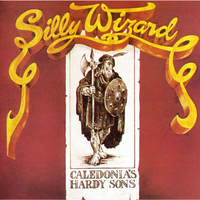| Glasgow Peggy (originale) | Glasgow Peggy (traduzione) |
|---|---|
| As when I come tae Glasgow toon; | Come quando vengo a Glasgow al cartone animato; |
| The hillen trips were right before me, | I viaggi in collina erano proprio davanti a me, |
| And the bonniest lass that e’er I saw, | E la ragazza più carina che abbia mai visto, |
| She lived in Glasgow, they called her Peggy | Viveva a Glasgow, la chiamavano Peggy |
| Their chief did meet her father soon, | Il loro capo incontrò presto suo padre, |
| And O! | E oh! |
| but he was wondrous angry; | ma era meravigliosamente arrabbiato; |
| He said, Ye may tak my owsen and kye, | Ha detto, puoi prendere il mio owsen e kye, |
| But ye maunna tak my bonnie Peggy. | Ma tu non puoi prendere la mia bonnie Peggy. |
| 'O haud your tongue, ye gude auld man, | 'Oh hai la tua lingua, tu guidi vecchio, |
| For I’ve got coos and ewes already; | Perché ho già tuba e pecore; |
| I come na to see your owsen or kye, | Vengo per vedere il tuo owsen o kye, |
| But I will tae your bonny Peggy. | Ma ti darò la tua bella Peggy. |
| He set her on his jet-black horse, | La fece salire sul suo cavallo nero corvino, |
| And he himsel had a fine grey naigie, | E lui stesso aveva una bella naigie grigia, |
| And they are on mony miles to the north, | E sono a molte miglia a nord, |
| And nane wi them but the bonny Peggy. | E nonna con loro tranne la bella Peggy. |
| I got now a thousand sheep, | Ho ora mille pecore, |
| A' grazin on yon hills sae bonny, | Un 'grazin su yon colline sae bonny, |
| And ilka hundred a shepherd has, | E ilka cento ha un pastore, |
| Altho I be but a Hieland laddie. | Anche se sono solo un ragazzo di Hieland. |
| Ox and sheep are bidden good enough | Il bue e la pecora sono abbastanza buoni |
| but corn stacks are mickel better | ma le pile di mais sono meglio del michel |
| they will stand in the drift and the snow | rimarranno nella corrente e nella neve |
| when the sheep will di wi the wind and the weather. | quando le pecore moriranno del vento e del tempo. |
| Ah, but I got fifty acres of land, | Ah, ma ho cinquanta acri di terreno, |
| It’s a' plowd and sawn already; | È già arato e segato; |
| I am Lord Donald o the isles, | Sono Lord Donald delle isole, |
| And why sud na Peggy be calld ma lady? | E perché sud na Peggy essere chiamata ma signora? |
| And seein' all yon castles and towers | E vedere tutti i tuoi castelli e torri |
| The sun shines down sae bright an bonny | Il sole splende così luminoso come un bonny |
| I am Lord Donald o the isles, | Sono Lord Donald delle isole, |
Traduzione del testo della canzone Glasgow Peggy - Silly Wizard

Informazioni sulla canzone In questa pagina puoi leggere il testo della canzone Glasgow Peggy , di -Silly Wizard
Canzone dall'album: Caledonia's Hardy Sons
Nel genere:Кельтская музыка
Data di rilascio:21.05.2006
Lingua della canzone:Inglese
Etichetta discografica:Shanachie
Seleziona la lingua in cui tradurre:
Scrivi cosa pensi del testo!
Altre canzoni dell'artista:
| Nome | Anno |
|---|---|
| 2006 | |
| 2006 | |
| 2006 | |
| 2006 | |
| 2012 | |
| 2006 | |
| 2006 | |
| 2006 | |
| 2006 | |
| 2006 | |
| 2006 | |
| 2006 | |
| 2006 | |
| 2006 | |
| 2006 | |
| 2006 | |
| 2006 | |
| 2006 | |
| 2006 | |
| 2005 |